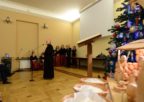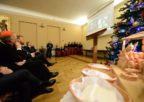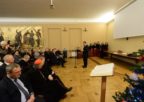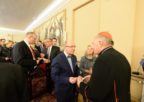On 16 January 2019, in Dom Arcybiskupów Warszawskich, a Christmas wafer meeting attended by the medical society and Metropolitan Archbishop of Warsaw, Cardinal-Priest Kazimierz Nycz, was held. The participants of the meeting, which is a part of a beautiful tradition that “moves hearts because the Lord was born”, included, among others: Health Minister Prof. Łukasz Szumowski, Undersecretary of State in the Ministry of Health Sławomir Gadomski, Undersecretary of State in the Ministry of Health Maciej Miłkowski, Undersecretary of State in the Ministry of Health Zbigniew Król, former Deputy Minister of Foreign Affairs Dr. Paweł Kowal, Priest in Warsaw Health Service Fr. Władysław Duda, Honorary President of the Polish Medical Association Prof. Jerzy Woy-Wojciechowski, President of the District Medical Council Dr. Łukasz Jankowski and Prof. Henryk Skarżyński, who delivered a lecture during the meeting entitled “World Hearing Centre – perspective of 25 years.”
In his lecture, Prof. Henryk Skarżyński repeatedly stressed that one of the foundations of the development of modern society is communication, as well as access to and exchange of information. While at the beginning of the 20th century the functioning and social position of a human being was in over 90% determined by manual skills, today this is the ability to communicate that is crucial in over 90%. Good hearing is necessary for communication. There are famous words credited to Seneca “It’s not good to see everything, it’s not good to hear everything”. However, medicine does everything to help thousands and even millions of people who due to various kinds of hearing loss are not able to live a normal life in today’s world.
Prof. Henryk Skarżyński also presented the biggest achievements of the World Hearing Centre of the Physiology and Pathology of Hearing he manages. Today, the Centre and “the Polish school of otosurgery ” created by Prof. Skarżyński are a recognizable brand in the world and a showcase of Polish science and medicine in the world. For 16 years, the largest in the world number of operations to improve the hearing have been performed in Kajetany. Many surgeries have been performed here for the first time in the world. The specialists from the Centre are pioneers in the various auditory implants for new groups of patients. In Kajetany the world’s first National Teleaudiology Network has been devised and launched, and innovative telemedicine tools are being developed. The Center is also a unique teaching and research facility. It conducts extensive scientific, clinical and teaching cooperation with dozens of countries around the world. The specialists from Kajetany carry out pioneer screening programs for early detection of hearing impairments on four continents.
During the meeting, a speech was also delivered by President of the District Medical Council, Dr. Łukasz Jankowski, who talked about social campaign #WspólneŚwięta [together at Christmas] conducted at the end of last year. It’s aim was to raise awareness of the problem of leaving the elderly at hospitals during the Christmas period without clear medical indications. The action, in which posters were put up in most (over 35) Mazovian hospitals, was joined by nearly 100 doctors.
The guests attending the Meeting also had the occasion to hear about the initiative “Medical Reason of State”, which was explained by its authors: Prof. Leszek Czupryniak, Head of the Clinic of Diabetology and Internal Diseases of UCK WUM, Dr. Michał Sutkowski, Spokesperson of the College of General Practitioners, Dr. Janusz Meder, President of the Polish Oncology Union, Anna Jasińska, spokesperson of “Medical Reason of State” and Dr. Paweł Kowal. “Medical Reason of State”, which is held under the honorary patronage of Cardinal Nycz, is a project that aims at developing a programme of changes in the health care system.
The meeting concluded with the wishes gave by Minister Łukasz Szumowski and Cardinal Kazimierz Nycz, directed at the whole medical society, in which they both emphasised the role of mutual kindness and respect for the patient.













